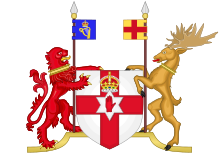Northern Ireland House of Commons
| House of Commons of Northern Ireland | |
|---|---|
| Devolved Parliament | |

Arms of Northern Ireland, 1924–1972
|
|
| Type | |
| Type | |
| History | |
| Established | 7 June 1921 |
| Disbanded | 30 March 1972 |
| Leadership | |
|
Ivan Neill (last)
|
|
|
Roderick O'Connor (last)
|
|
| Elections | |
|
Single transferable vote (1921–1929) First-past-the-post (1929–1972) |
|
| Meeting place | |
 |
|
| Commons Chamber Parliament Buildings, Stormont, Belfast |
|
The House of Commons of Northern Ireland was the lower house of the Parliament of Northern Ireland created under the Government of Ireland Act 1920. The upper house in the bicameral parliament was called the Senate. It was abolished with the passing of the Northern Ireland Constitution Act 1973.
The House of Commons had a membership of 52. Until 1969, 48 were from territorial constituencies and 4 were for graduates of Queen's University of Belfast; in that year the QUB seats were abolished and four extra territorial constituencies created on the outskirts of Belfast, where the population had grown. For the electoral constituencies used, see List of Northern Ireland Parliament constituencies 1921-1973.
The House of Commons fulfilled the normal lower house functions to be found in the Westminster System of Government. Its roles were
The Government of Ireland Act required that elections to the House of Commons be by the Single Transferable Vote (STV) electoral system first introduced in Ireland by the Local Government (Ireland) Act 1919. Its inclusion in the 1920 Government of Ireland Act was deliberate. It was intended to provide electoral opportunities for non-Unionists. (A similar legal requirement had been set for Northern Ireland's sister state, the non-operative Southern Ireland, and also existed in the Irish Free State).
Under the Act the Parliament of Northern Ireland was given the legislative power to alter the electoral system from three years after its first meeting. The use of STV was criticised strongly among the grassroots of the governing Ulster Unionist Party, who viewed it as "unbritish" (apart from four university constituencies, the rest of the United Kingdom used First Past the Post). The loss of eight seats by the UUP in the second parliamentary election caused a major row within the party. Rather than deal with questions as to why it faced declining popularity the party replaced STV by the less-proportional (and so less helpful to minorities) First Past the Post. However STV was retained for the election of the 4 MPs from Queens University.
...
Wikipedia
